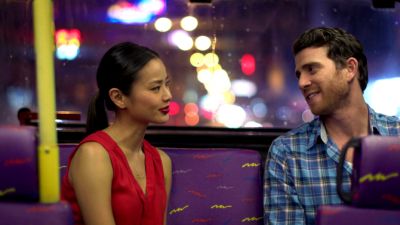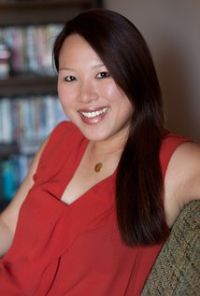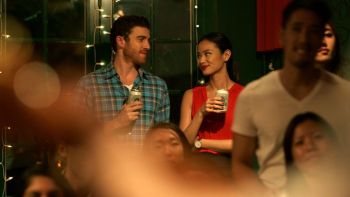
By Tom Ue.
Emily Ting graduated from NYU’s Tisch School of the Arts. She was previously mostly known for her producing work. Ting produced the feature The Kitchen (2012), an ensemble comedy directed by Ishai Setton and starring Laura Prepon, Bryan Greenberg, and Dreama Walker. Recently, Ting produced Stephen Suettinger’s A Year and Change (2015), starring Bryan Greenberg, Claire van der Boom, T.R. Knight, Marshall Allman, and Jamie Hector. She participated in the Film Independent Producing Lab with the project.
In what follows, Ting discusses Already Tomorrow in Hong Kong (2015), a film that she wrote, produced, and directed. Starring Jamie Chung and Bryan Greenberg, the film had its World Premiere at the 2015 Los Angeles Film Festival and will be distributed theatrically and on VOD by Gravitas Ventures in spring 2016.
Many congratulations on Already Tomorrow in Hong Kong, which presents the city beautifully. Let’s begin by talking about yourself and your work. You graduated from NYU Film School, after which you returned to Hong Kong to work on family business. Where did you grow up?
I was actually born in Taiwan. When I was 10, I moved to San Francisco with my mom. We lived in the Bay Area for a few years, before moving to upstate New York where I attended high school. Then, I lived in New York City for college and a few years post college. I guess I still consider myself a New Yorker at heart, even though I haven’t lived there in years.
You have said that you feel more at home in the US than you do in Asia. Can you elaborate?
 This is referring to the irony I felt of being an Asian in Asia, but not quite feeling at home. I am not saying one culture is better than another or anything, but because I grew up largely in the US, I just felt more at home there. Little cultural things or something as silly as knowing certain pop culture references. I think that if I had made more friends in Hong Kong that shared my interests, it would have helped things. I just didn’t connect with a lot of people when I lived there. Ironically, I’ve made more friends with similar interests in Hong Kong since making the movie than I did when I was actually living there.
This is referring to the irony I felt of being an Asian in Asia, but not quite feeling at home. I am not saying one culture is better than another or anything, but because I grew up largely in the US, I just felt more at home there. Little cultural things or something as silly as knowing certain pop culture references. I think that if I had made more friends in Hong Kong that shared my interests, it would have helped things. I just didn’t connect with a lot of people when I lived there. Ironically, I’ve made more friends with similar interests in Hong Kong since making the movie than I did when I was actually living there.
You have also said that Hong Kong, despite its cosmopolitanism, can be isolating. Can this true for NY as well?
I think that Hong Kong felt alienating to me because I just didn’t make a lot of friends while I was living there. My life consisted so much of working, and the people I was in contact with were mainly focused on work as well. It’s funny: you could be walking on the street and be surrounded by so many people, probably more people than you’ve ever encountered in other cities, and yet still feel more isolated than ever. New York was an equally tough city to navigate. I had great friends there and was so sad to be leaving at the time, but I wouldn’t have left New York for Hong Kong, if I didn’t think something was missing.
Richard Linklater is clearly an influence here, as is, perhaps, Woody Allen. What are some of your other influences?
Before Sunset (2004) is my favorite movie in the trilogy and also my favorite movie of all time, and Woody Allen is definitely one of my favorite filmmakers of all time. But I was also very much influenced by Sofia Coppola’s Lost in Translation (2003) and all of Wong Kar Wai’s films, especially Chungking Express (1994) and In the Mood for Love (2000). So on the one hand, I’m very much influenced by the very talky and dialogue-driven works of Richard Linklater and Woody Allen, but on the other, I’m also greatly inspired by the mood and atmosphere created by the works of Sofia Coppola and Wong Kar Wai. And it’s probably no surprise to anyone that I love films about relationships!
Let’s talk more about the film! The first meeting between Josh (Josh Greenberg) and Ruby (Jamie Chung) takes place on a Friday night and there’s a lovely scene where the two characters look up at a building that is lit up. Josh tells Ruby that there are still people working at 11PM. Do you find this work ethic as belonging to financial centres in general or specific to Hong Kong?
I worked for my family’s toy company for five years in Hong Kong, and I think that this work ethic belongs to Hong Kong in general. My first year there, I didn’t leave the office until 11:00PM most nights. Everyone works so hard to support their family, but then they end up neglecting their family because they’re working so hard. I experienced that first hand growing up because my dad was just always working and I never saw him. I admire that kind of work ethic, but I also felt like it wasn’t the way I wanted to live my life ultimately.
The film questions the concepts of being an “expat” and an “immigrant.” What do you see as some of the differences between them? Do you think that these labels continue to be useful?
Honestly, I’ve never even thought much about the concept of “expat” until I became one in Hong Kong. But when I moved to the U.S. as a kid, I was considered an “immigrant.” And while the official difference may be that an expat is moving to a foreign country temporarily while an immigrant is moving permanently, I think that there is just a more glamorous connotation associated with being an expat. When you’re a westerner moving to Asia (no matter for how long), you’re considered an expat. But when you’re Asian moving to the west, you’re considered an immigrant.
What were some of the challenges that you faced as a first-time director?
 I think that being a first-time director is already difficult, but to make your first feature in a foreign country only makes it that much more challenging. Even though I had lived in Hong Kong before, I had never worked on a film set there. There are little ways of working that are just different from what you’re used to. I had brought over some of my key crewmembers to Hong Kong (like my DP, production designer, editor, etc.). I had to make sure that they could communicate and work together with the various crew. Everyone was extremely professional, but it did take a little time to get into the groove of working together.
I think that being a first-time director is already difficult, but to make your first feature in a foreign country only makes it that much more challenging. Even though I had lived in Hong Kong before, I had never worked on a film set there. There are little ways of working that are just different from what you’re used to. I had brought over some of my key crewmembers to Hong Kong (like my DP, production designer, editor, etc.). I had to make sure that they could communicate and work together with the various crew. Everyone was extremely professional, but it did take a little time to get into the groove of working together.
Josh Silfen, the Director of Photography, captures the colours of the city beautifully. Tell us about some of your cinematographic decisions!
From the very beginning, I had wanted Hong Kong to look very romantic, but I also wanted Hong Kong to look like Hong Kong. I wanted the film to have a very intimate feel, and not have it look too glossy. We were joking that we didn’t want it to look like a perfume commercial! So we decided to go with a handheld and shallow depth of field aesthetic, mixed with steadicam for all the long walking and talking sequences. We also used available light as much as we could and let the neon lights of Hong Kong be its own light source. And we just used a China Ball on boom pole to fill in the actors’ faces whenever we needed to. I also wanted the film to look very colorful and vibrant, and the costume and production design all played into that as well.
The leads, Bryan Greenberg and Jamie Chung, are a real-life couple. Do you think that this affected how they relate onscreen?
I didn’t plan on hiring a real-life couple, but got really lucky with the casting. A romantic film hinges solely on the chemistry between your two leads, and it’s something that’s impossible to engineer. They either have it, or they don’t. And it was very easy for them to play two people falling in love with each other when they’re already in love in real life. I think the biggest challenge for the actors is the beginning of the film where they are supposed to be strangers just meeting for the first time. They had to strip away their familiarity with each other and “unknow” each other so to speak.
How did they get involved in this project?
I had worked with Bryan Greenberg before on two projects that I had produced. At the LA premiere of The Kitchen (2012), he was asking me what I was working on next, and I told him about the script. Right away, he said that sounds like a perfect project for his then girlfriend Jamie Chung. And actually, Jamie was already my first choice for the role, so the stars sort of just aligned from there! I sent him the script to pass along to Jamie, and two weeks later, they emailed me to say that they’re both in!
Did the screenplay develop organically through improvisation or was it fully scripted beforehand? If the former, how did the screenplay change during filming?
The screenplay changed pretty drastically from the time the actors signed on and when we went into production, mainly in the third act. We had a completely different ending written originally, but after much discussion, we decided to go with the more ambiguous ending. And once we locked the script, most of what you saw on screen was scripted. There may have been a few improvised lines here and there, but they kept to the script pretty closely.
Did you have the specific locations and shots in mind as you were writing the script?
I would say that I probably wrote 80% of the locations into the script. There were very specific spots that I had wanted to highlight in the film – the Mid Levels Escalators, Soho, Lan Kwai Fong, the Promenade, the ferry, and the Temple Street Market, etc. Even some of the bars and restaurants that I had a personal connection to were written into the script. And I got really lucky in that I was able to get most of them for the film!
The film raises and questions many stereotypes of the city including the importance of money to the city and how interracial and intergenerational relationships are viewed. Do you think that these views are especially pertinent in Hong Kong?
I want to make it clear that these are my personal views of certain stereotypes I associate with Hong Kong, and that it may not necessarily represent people’s general viewpoints. Ruby’s kind of judgmental in the film, and so am I! I think it’s interesting to make her a little flawed and have these viewpoints that may not necessarily be popular. But when I was living in Hong Kong, I absolutely made judgments when I saw an older white man with a younger Asian woman. And yet, I was dating a white guy myself, so I would often wonder what other people thought of that. Now that I’ve made a film about an interracial couple, I’m also experiencing firsthand the rage from many fellow Asians who felt like I betrayed my own race somehow. It’s still quite a touchy subject.
News about Hong Kong in recent years has concentrated on the political. What are your views? Do you think that the creative energies of filmmakers are at risk of censorship, whether self or state imposed?
I think that Hong Kong is sort of having its moment right now, especially in the political spotlight. The film was shot six months before the umbrella revolution, and in a way, I almost feel like the film is a bit dated by not even addressing any of the new political development that’s been happening in Hong Kong in the last couple of years. But that’s the life of an indie film! From shooting to release, it can literally take years. I do think that all these recent political developments have invigorated the creative energies of local filmmakers. There was a recent film made locally called 10 Years (2015) that imagines what Hong Kong would be like in ten years under China’s rule. It’s an incredibly bleak and pessimistic viewpoint, and it’s breaking box office records in Hong Kong. People are really embracing this new dialogue about Hong Kong’s political future. And I think that just the fact that the film can even be released in Hong Kong and go on to make so much at the box office means that there is still hope for creative freedom!
What is next for you?
I have a couple of films in development right now. I’m trying to get actors attached and then financing. But at every single screening Q&A, someone always asks if there’s going to be a sequel, so I am kicking around a few ideas for a potential sequel that I may be writing next!
Thanks so much for this lovely film, and we look forward to many more!
Tom Ue writes for Film International. His bestselling edited collection World Film Locations: Toronto was published by Intellect in April 2014, and he is presently writing a book about the White Messiah in contemporary films. He has recently completed the Dictionary of Literary Biography 377: Twenty-First Century British Novelists (Gale, 2015). Ue gained his Ph.D. from the Department of English Language and Literature at University College London and he is presently a Visiting Scholar in the Department of English at the University of Toronto at Scarborough.
